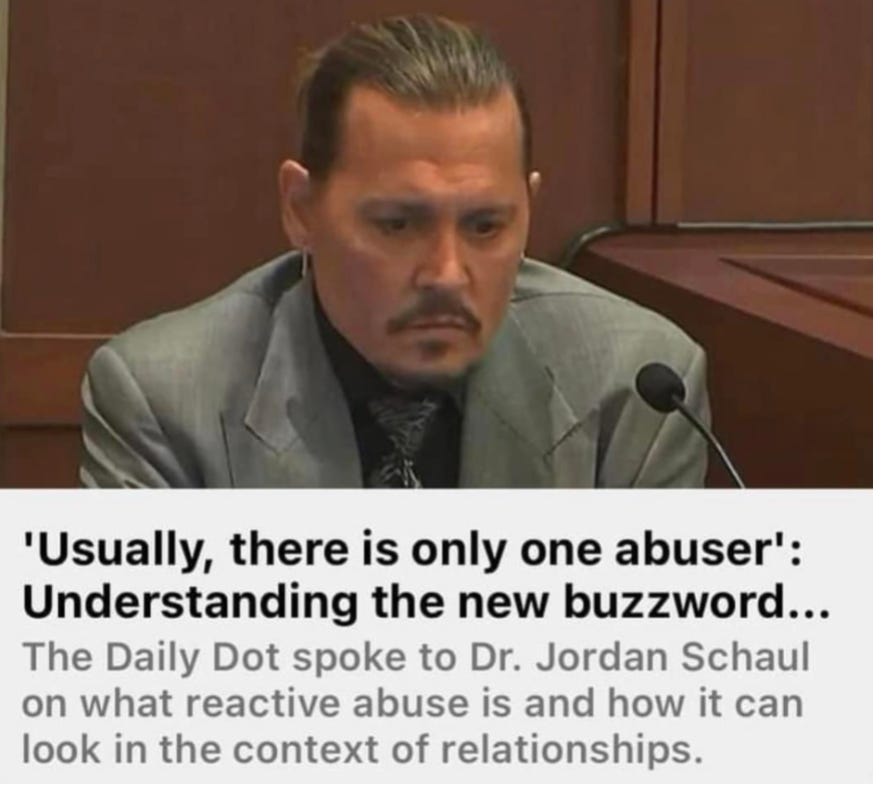The OJ Simpson Case Failed to Explain Intimate Partner Violence in Ways that the Amber Heard Case has Only Begun to Explore
By Jordan Schaul | Scapegoat Strength
Today, the world is in crisis. As a diversion, at least in America, we have indulged ourselves in fandom over another media spectacle at the nexus of forensic psychology and celebrity.
It is not the first time we’ve been glued to live courtroom proceedings and captivated by eccentric witness antics at the expense of a famous victim’s misfortune and a famous perpetrator’s demise.
Despite all the hype, pomp, and circumstance surrounding the Heard-Depp trial, the stakes are arguably much lower than for past trials, including and most notably, the OJ Simpson criminal case. But what is at stake in this case for the parties and the public?
In 1994, the Simpson trial cast light on domestic abuse making intimate partner violence, as it is now called, a public health concern. Almost thirty years later, public sentiment regarding the very private affair of another public couple reminds us that we still have much to learn about emotional abuse. The terms '‘trauma bond”, “abuse cycle” and “cluster B personality disorders” have certainly permeated the public’s consciousness, but defining their meaning and recognizing their presentation are two different things.
Amber Heard is on trial for defamation, and the civil case against her has largely focused on the physical aspect of domestic violence and relevant mental health issues, which are ancillary to the case. They are also, ostensibly, the reason OJ Simpson ultimately faced a sentence of life in prison in the first place - he was emotionally and physically abusive well before he was tried for killing his ex-wife.
“Her [Nicole’s] murder hurled into the forefront a conversation that advocates had been having for years — that it could happen anywhere, to anyone,” said American University professor Rachel Louise Snyder in a 2019 AP News article. Snyder who wrote “No Visible Bruises: What We Don’t Know About Domestic Violence Can Kill Us”, explores this global pandemic that we don’t talk about
The ongoing case between the plaintiff, an iconic older male star, and his ex-spouse, an emerging female one - is a stark reminder that domestic violence is not only exercised through physical abuse. This misperception seems to be lost on people who continue to support the defendant - an issue I recently commented on for a related interview on reactive abuse.
Live simulcasting of high-profile trials encourages our worst voyeuristic tendencies. But they also present psychoeducational value, which is often obscured or missed in the chaos of a 24-hour sensationalized news cycle amplified and distorted by clickbait-dense social media coverage.
Beyond the images of fecal deposition and the live feed of a vaping witness en route, the case has been enlightening. It has fostered a conversation about how emotional dysregulation is influenced by substance abuse and pathological personality traits and diagnosable disorders. Outside of a courtroom or classroom, these issues are largely only discussed in confidence in a therapeutic relationship.
Whether Mr. Depp physically assaulted Ms. Heard continues to be a contentious focal point of the trial, but the allegations seem to be unsubstantiated. It’s the behavior of Ms. Heard in the courtroom in addition to her perpetrated and purported acts of subtle gaslighting and sometimes blatant manipulation that have elicited such vitriol from the public. Ms. Heard seems to have a very interesting relationship with the truth.
Regardless of Ms. Heard’s presumptive diagnosis of comorbid cluster B personality disorders, it’s her narcissistic and perhaps sociopathic behavior, which has generated so much negative attention. And it is this behavior, which so many can relate to that seems to have received little mention from forensic clinicians. Her sense of entitlement and her lack of humility seems to come across to viewers and they are responding.
Ms. Heard’s testimony has been triggering for victims of narcissistic abuse. Narcissistic perpetrators employ a more covert and nuanced kind of violence that often accompanies physical assault. Psychological and emotional abuse is more difficult to sensationalize in headlines but it is often more harmful, wreaking havoc on the mental health and welfare of victims.
Emotional trauma is the invisible hallmark of narcissistic abuse that few people talk about and even more fail to recognize. Sure, the case has presented things we wish we could unsee and ‘unhear’, but it also validates the experiences of people who have no visible scars.
The Simpson case polarized audiences on the basis of race, gender, and celebrity and centered around egregious and lethal criminal misconduct. What it didn’t do was expose the domestic abuse that preceded the murder of Nicole Brown Simpson in ways that could have become part of public discourse surrounding intimate partner violence. The Amber Heard case seems to do just that as it revolves around gaslighting and more overt manipulation.
Historically, people regard physical violence as more harmful than emotional violence. In many instances, the intimate and embarrassing details presented in this trial demonstrate how the converse can be true.
Up Next: Interviews w/ Psychotherapist Laura Taylor, Retired LAPD Detective Jack Struble & Domestic Violence Consultant Will Kesselman






